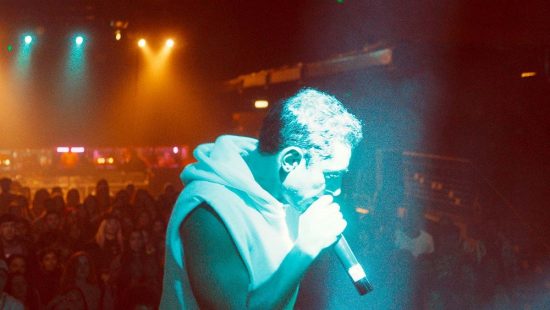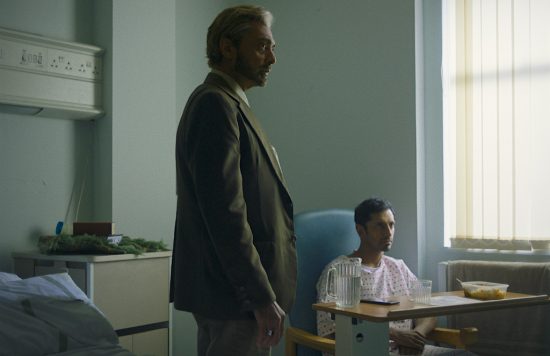Director Bassam Tariq talks to Live for Films about Mogul Mowgli
Interviewing Bassam Tariq on his new film Mogul Mowgli, Bassam came across as a cheery director and it became clear over the course of the interview, he is looking to push boundaries in film and experiment in this relatively new art form. The film played at this years London Film Festival and you can read my review here.
Discussing the film, culture, collaborating with his lead actor, and the intransient rooms in a house; Bassam was a very thoughtful individual and I was intrigued by his answers and how Mogul Mowgli came to be.
You and Riz Ahmed collaborated in the writing room, what was it like collaborating with him on what feels like a very personal project?
Yeah man, I think we both came from a very similar place growing up. I came from Queens and Queens is a very similar place to Wembley and so those parallels were really easy to build off on. I loved his music and I was really interested to see if we could him push him into more interesting vulnerable places and he was really game for it. So that’s where we took it and it was really tough for ourselves to do that, but really the whole test of this thing was whether we could allow ourselves to be vulnerable on camera. I feel like so much of our stuff can be stuck on humour and can be stuck in this weird genre so we’re never giving our full selves.so let’s really throw ourselves into this and that was a good drive and was very impassioned from the start to the finish. Even now coming to the release of this film, things are still impassioned between us. We’re very close friends and honestly, it feels like that relationship and to me that’s what this is all about, celebrating this friendship between him and me.
I could really feel the collaboration between you two and moving from the script to the set was there any times when you had to discuss what would Riz Ahmed or the character Zaheer do in the film?
Well with that you’re not cutting the film. With digital you’re filming and it becomes a “yes and” approach and there are so many ways we could have cut the film with all the options we had, making the character more like Riz or more like me, but I think we found a good balance where there’s a bit of me and a bit of him in it.
Was there anything about the British experience that Riz Ahmed had to guide you through?
Everything man. I don’t know anything about being a British-Asian, I’m a Queens, New York kid and I’m in Texas at the moment so I knew nothing! At first, I was a bit resistant to it, thinking what does this actor have to teach me from my documentary background that I can’t learn on my own but as I was walking the streets of Southall with him he was just spitting all this knowledge about all the stuff that’s been going on, I realised I needed to shut up and listen to what he has to teach me. So it was him and I have a few friends that are researchers that really hooked me up with different families, but really it was that our families are so similar it didn’t feel that hard to build all this in.
Yes and there’s a lot of similarities to people regardless of their background and I felt it had a broad appeal.
That’s great man, That’s the worry with this if anyone is going to connect to it so that’s always a worry.
For myself growing up with people from different backgrounds I saw lots of Zaheer in people I grew up with and reflections of his father in mine. Speaking of the father, how important was it for you to focus on the father-son relationship?
That was so central to the success of this film. I realised that to get weird, and something I’ve realised with everything I’m working on now is that you need to anchor it in a relationship that we care about and then I think you can take audiences of all types to wherever the hell you want to go. You have to anchor them in a relationship that we can sink our teeth into.
One thing I did enjoy about the film was the decision to film in the 4:3 aspect ratio.
Oh, you liked that? Why?
Well I felt it pulled the camera in closer to the actors. Was there any push back on that decision?
Honestly, there wasn’t [any pushback] and I really regretted it when I did it and we didn’t have safety bars when we shot it, so it was always filmed in 4:3. It’s one of those decisions you can make and you look back and you think “Oh my God you did this” and it really is an unforgiving frame, but there is a lot of reasons why I did it that way and something I’ve been saying today is that cinema is a new language and we’re still learning to tell these stories. So I feel like we need to allow ourselves to make and experiment and try things and that’s what this is really about. You want your audiences to connect but it’s ok for us to trip. I want to be able to make mistakes I don’t want to make perfect films, I don’t know what they look like, to me a perfect film could be an imperfect film, because that’s what resonates with me.
** SPOILERS below discussing the films ending**
Now a lot of the films deals with generational trauma, you have that represented by Zaheer, his dad and the younger rapper and I was wondering what you thought about the relationship between those three.
That’s really great, I’m really happy you picked up on that because that’s where it really ends where all three of these characters converge. In a transient stage where they have this makeshift stage where all three generations collide in the bathroom its kind of the idea of it and its tough to really nail in but its so important for it to exist there. It’s based on this idea that it won’t happen in the living room, it doesn’t happen in a place where you live but it happens in a transient place. You don’t live in a bathroom you live in a transient stage, you do something there and you leave, you perform there and you leave and the idea of the three of them in this transient place felt very right as an ending for this film.
Mogul Mowgli is in cinemas from 30th October; to experience the world of the film, head to www.mogulmowgli.co.uk.
Near the Jugular, a season of inspirational and influential films chosen by Bassam Tariq and Riz Ahmed runs at BFI Southbank and on BFI Player from 19 October – 30 November.











